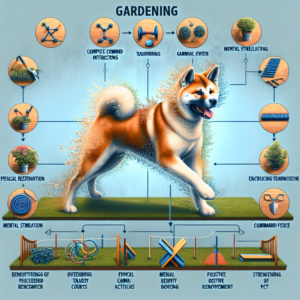Contents
Introduction
Owning an Akita dog is a rewarding experience, but like all breeds, they require proactive healthcare to ensure they live long, healthy lives. Akitas are strong, independent dogs, but they can be prone to specific health issues that need careful attention. Regular veterinary care, a balanced diet, and preventive measures are essential in keeping your Akita in optimal health. This article will guide you through the common health concerns of Akitas, offer tips on maintaining their well-being, and discuss the role of nutrition and veterinary care in their overall health.
Breed-Specific Health Concerns
Like many purebred dogs, Akitas are susceptible to certain health issues that are common within the breed. Understanding these breed-specific health concerns will help you better care for your dog and ensure they receive timely medical attention.
1. Hip Dysplasia
Hip dysplasia is a hereditary condition where the hip joint doesn’t fit into the hip socket properly, leading to arthritis and joint pain over time. This condition is particularly common in larger breeds like the Akita.
Signs to Watch For: Difficulty standing up, reluctance to walk or run, and lameness in one or both hind legs.
Preventive Measures: Regular exercise, maintaining a healthy weight, and avoiding excessive strain on the joints. If your Akita shows early signs, your vet might recommend supplements like glucosamine to support joint health.
2. Autoimmune Disorders
Akitas are prone to autoimmune disorders, such as hypothyroidism and autoimmune thyroiditis. In these conditions, the immune system attacks the body’s own tissues, leading to hormone imbalances and organ dysfunction.
Signs to Watch For: Weight gain, lethargy, and coat thinning in the case of hypothyroidism.
Preventive Measures: Regular blood tests to monitor thyroid function, especially as your Akita ages. If diagnosed early, medications can help manage thyroid levels.
3. Progressive Retinal Atrophy (PRA)
Progressive Retinal Atrophy is a genetic condition that causes the retina to degenerate, leading to blindness over time. While PRA is not painful, it can greatly affect your dog’s quality of life as they lose their vision.
Signs to Watch For: Difficulty navigating in low light, bumping into objects, and changes in their behavior when walking.
Preventive Measures: Regular veterinary eye exams can help catch this condition early, although there is no cure. Management focuses on ensuring your Akita’s environment is safe and familiar.
4. Gastric Dilatation-Volvulus (GDV) or Bloat
GDV, commonly known as bloat, is a life-threatening condition that occurs when the stomach fills with gas and twists on itself. This is especially common in deep-chested breeds like the Akita.
Signs to Watch For: Swollen abdomen, retching without vomiting, restlessness, and signs of discomfort.
Preventive Measures: Feed your Akita smaller, more frequent meals rather than one large meal. Avoid vigorous exercise immediately after meals, and consider discussing preventive measures like gastropexy (a surgical procedure that tacks the stomach to the abdominal wall) with your vet if your Akita is at high risk.
5. Allergies
Akitas are known to suffer from food and environmental allergies. These can lead to skin problems, digestive upset, and respiratory issues.
Signs to Watch For: Itchy skin, red or inflamed ears, vomiting, diarrhea, or sneezing.
Preventive Measures: Identifying the source of the allergy is the first step. Your vet can perform allergy testing to determine if your Akita is allergic to certain foods, environmental triggers, or even flea bites. Once the trigger is identified, eliminating it from their environment or diet can reduce symptoms.
Routine Veterinary Care
Regular veterinary visits are crucial to maintaining your Akita’s health. Preventive care not only helps address breed-specific concerns but also ensures your dog receives timely vaccinations and screenings to catch any health issues early.
1. Regular Check-ups
Routine check-ups are essential to monitor your Akita’s overall health. During these visits, your veterinarian will conduct a physical examination, assess your dog’s weight, and check for any signs of illness or discomfort.
Recommended Frequency: Puppies should see the vet every 3-4 weeks until they are 16 weeks old, then every 6-12 months for adults, and more frequently for senior dogs (7 years or older).
2. Vaccinations
Akitas should receive vaccinations according to your vet’s recommended schedule. Common vaccinations include:
- Core Vaccines: Rabies, distemper, parvovirus, and adenovirus.
- Non-core Vaccines: Leptospirosis, Lyme disease, and bordetella (kennel cough), depending on lifestyle and risk factors.
These vaccines help protect your Akita from serious, potentially life-threatening diseases.
3. Dental Care
Dental hygiene is often overlooked, but it’s a critical part of your Akita’s health. Poor dental care can lead to tooth decay, gum disease, and even systemic infections that affect organs like the heart and kidneys.
Tips for Dental Health: Brush your Akita’s teeth regularly with dog-specific toothpaste, offer dental chews, and schedule annual dental cleanings with your vet to keep their teeth and gums in optimal condition.
4. Preventive Medications
Flea and Tick Preventatives: Akitas are prone to ticks and fleas, which can carry diseases. Use flea and tick preventatives recommended by your vet to protect your dog.
Heartworm Preventatives: Heartworms are spread by mosquitoes and can cause serious damage to the heart and lungs. Monthly heartworm preventatives are essential in most regions.
5. Choosing a Veterinarian
It’s important to choose a veterinarian who is experienced with the Akita breed. They will understand the breed’s unique health concerns and be able to provide the best possible care. Ask for recommendations from other Akita owners, research local veterinarians, and ensure they are knowledgeable about the specific health needs of large, independent breeds like the Akita.
Nutrition and Diet
Diet plays a critical role in maintaining your Akita’s health. Choosing the right food and managing your Akita’s weight can prevent many health issues, including obesity, joint problems, and digestive disorders.
1. Age-Appropriate Nutrition
Your Akita’s dietary needs will change as they grow. Puppies, adults, and senior Akitas all have different nutritional requirements.
- Puppy: Akita puppies need high-quality puppy food that is rich in protein, healthy fats, and essential nutrients to support their rapid growth.
- Adult: Adult Akitas require a balanced diet with moderate protein and fat content to maintain their muscle mass and energy levels. The right balance will also help prevent obesity.
- Senior: Senior Akitas may require food with fewer calories but higher levels of fiber and joint-supporting nutrients like glucosamine and chondroitin.
2. Portion Control and Feeding Guidelines
Akitas are large dogs, so portion control is important to prevent overeating and obesity. Follow the feeding guidelines provided by your dog food manufacturer or your vet.
Frequency: Feed adult Akitas two meals a day, and adjust portion sizes based on their activity level and metabolism.
Weight Monitoring: Keep an eye on your Akita’s weight and adjust their diet as needed. Regular weight checks at the vet will help ensure they remain within a healthy weight range.
3. High-Quality Dog Food
High-quality dog food is essential for Akitas. Look for food that lists meat as the first ingredient, includes a variety of vegetables and fruits, and avoids fillers like corn, soy, and by-products. If your Akita has a specific food allergy or sensitivity, consider food that is hypoallergenic or designed for sensitive stomachs.
4. Special Considerations
If your Akita has specific health concerns, such as joint problems, allergies, or digestive issues, consider special diets or supplements recommended by your vet. Omega-3 fatty acids, antioxidants, and fiber can help with inflammation, skin health, and digestion.
Conclusion
Proactive healthcare is key to ensuring your Akita enjoys a long, happy, and healthy life. By understanding breed-specific health concerns, scheduling regular veterinary check-ups, providing appropriate nutrition, and practicing preventive care, you can help your Akita avoid many common health issues. A well-balanced diet, regular vet visits, and early detection of health concerns will allow your Akita to thrive, ensuring they stay by your side for years to come.


